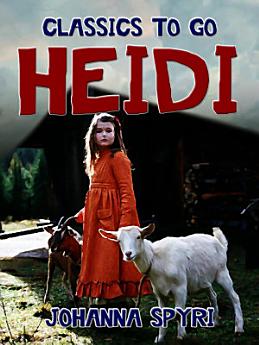Heidi
Jan 2021 · Otbebookpublishing
E-Book
266
Seiten
family_home
Zulässig
info
reportBewertungen und Rezensionen werden nicht geprüft Weitere Informationen
Über dieses E-Book
Die beiden Kinderbücher Heidis Lehr- und Wanderjahre und Heidi kann brauchen, was es gelernt hat der Schweizer Autorin Johanna Spyri (1827–1901) aus den Jahren 1880 und 1881 gehören zu den bekanntesten Kinderbüchern der Welt. Mit ihren Heidi-Büchern schuf Johanna Spyri ein noch heute weit verbreitetes romantisches und idealtypisches Bild der Schweiz.
Autoren-Profil
Johanna Spyri, born Johanna Louise Heusser on June 12, 1827, in the picturesque village of Hirzel, Switzerland, is a name that resonates deeply within the realm of children's literature. Growing up in a household brimming with intellectual curiosity, Johanna was influenced by her father, a physician, and her mother, a poet. This nurturing environment fostered her love for storytelling and the natural world, themes that would later permeate her literary works.Spyri's most famous creation, "Heidi," published in 1881, is a testament to her ability to weave the simplicity of rural life with profound emotional depth. The novel's success was not just a literary triumph but also a cultural phenomenon, highlighting the therapeutic power of nature and the innocence of childhood. It has been translated into over 50 languages and adapted into numerous films, plays, and television series, cementing Spyri's legacy as a pioneer in children's literature.Despite her acclaim, Spyri's life was not without controversy. She was a progressive thinker, advocating for the education and empowerment of women at a time when such ideas were revolutionary. Her works often subtly critiqued the rigid societal norms of 19th-century Switzerland, promoting a message of compassion and understanding.Spyri's influence extends beyond her own era, inspiring contemporary writers to explore themes of resilience, kindness, and the healing power of nature. Her ability to capture the essence of human experience in a way that transcends time and culture continues to endear her to readers of all ages. Johanna Spyri remains a beacon of literary brilliance, her stories as relevant and enchanting today as they were over a century ago.
Dieses E-Book bewerten
Deine Meinung ist gefragt!
Informationen zum Lesen
Smartphones und Tablets
Nachdem du die Google Play Bücher App für Android und iPad/iPhone installiert hast, wird diese automatisch mit deinem Konto synchronisiert, sodass du auch unterwegs online und offline lesen kannst.
Laptops und Computer
Im Webbrowser auf deinem Computer kannst du dir Hörbucher anhören, die du bei Google Play gekauft hast.
E-Reader und andere Geräte
Wenn du Bücher auf E-Ink-Geräten lesen möchtest, beispielsweise auf einem Kobo eReader, lade eine Datei herunter und übertrage sie auf dein Gerät. Eine ausführliche Anleitung zum Übertragen der Dateien auf unterstützte E-Reader findest du in der Hilfe.







